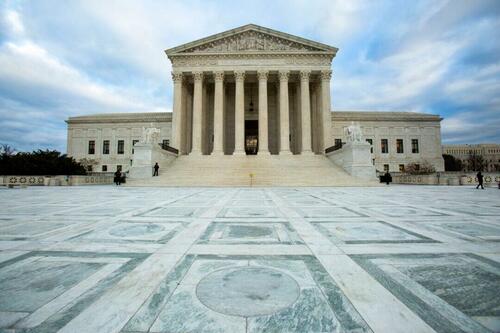
Authored by Matthew Vadum via The Epoch Times (emphasis ours),
A Roman Catholic diocese is appealing to the U.S. Supreme Court a New York appeals court ruling that requires religious charities to provide abortion coverage in their employee health insurance packages.

Lori Windham, vice president and senior counsel at the Becket Fund for Religious Liberty, confirmed during an online news conference on July 25 that the Roman Catholic Diocese of Albany, New York, is preparing a petition for certiorari, or review, to be filed in coming weeks with the nation’s highest court. The Becket organization is part of the diocese’s legal team.
The case is Roman Catholic Diocese of Albany v. Harris. Adrienne A. Harris is Superintendent of the New York Department of Financial Services, the agency that issued the health care insurance regulation that’s in dispute.
The deadline for filing the petition for certiorari, or review, was originally Aug. 19, but on July 26, U.S. Supreme Court Justice Sonia Sotomayor extended the deadline to Sept. 18.
The case has been working its way through the judicial system for years.
In 2017, the New York Department of Financial Services issued a regulation requiring that employers fund abortions through their employee health insurance plans. The regulation exempted religious entities whose “purpose” is to inculcate religious values and who “employ” and “serve” primarily coreligionists. At the same time, the regulation forced religious organizations to cover abortions if they have a broader religious mission, such as serving the poor, or if they hire or serve people regardless of their faith.
Various Roman Catholic dioceses, along with Anglican nuns and Lutheran and Baptist churches, sued.
The Appellate Division of the Supreme Court of New York ruled in favor of the state in July 2020.
But in November 2021, the U.S. Supreme Court summarily vacated that decision.
The nation’s highest court sent the case back to the Appellate Division of the Supreme Court of New York for further consideration in light of the U.S. Supreme Court’s June 2021 ruling in Fulton v. Philadelphia.
In the Fulton ruling, the U.S. Supreme Court unanimously ruled that a Roman Catholic charity in Pennsylvania may refuse on First Amendment religious freedom grounds to place children with same-sex couples.
Writing for the court in that case, Chief Justice John Roberts said that Philadelphia had violated the other side’s First Amendment rights.
The religious views of the diocese-affiliated Catholic Social Services “inform its work in this system,” Chief Justice Roberts wrote. The charity believes that “marriage is a sacred bond between a man and a woman.”
“Because the agency understands the certification of prospective foster families to be an endorsement of their relationships, it will not certify unmarried couples—regardless of their sexual orientation—or same-sex married couples.”
However, when the Appellate Division of the Supreme Court of New York reconsidered the case in June 2022, it ruled in favor of the state, finding that the Fulton ruling didn’t apply to the case and that the abortion insurance mandate did not violate the First Amendment.
On May 21 of this year, the New York Court of Appeals affirmed the ruling of the Appellate Division.
“Under Fulton, both the regulation itself and the criteria delineating a ‘religious employer’ for the purposes of the exemption are generally applicable and do not violate the Free Exercise Clause,” the court held.
Ms. Windham said in recent years the U.S. Supreme Court has ruled in favor of employers “every single time” in three cases when they have objected to having to provide coverage for contraception or abortion medication for their employees.
Despite that, New York decided to impose an abortion coverage mandate and “go all the way in the face of these three Supreme Court decisions.” First, the state enacted the insurance regulation and then the New York State Legislature decided to codify the regulation in state law, she said.
The exemption from the mandate is narrow, Ms. Windham said.
“If you primarily serve people of your own faith, then you can have an exception, but if you open your doors to all … [to] care for anyone regardless of your faith, if you’re out there offering a cup of soup to anyone who’s hungry, regardless of what their faith background is, then you lose your religious freedom protections, you lose your exemption under the statute, and you must also pay for abortions.”
This means that a “religious test” is being imposed on religious groups that provide social services, she said.
“All of these different groups are stuck with this abortion mandate, and all of them because of the work they do, and because of the good that they try to do within their communities, are being hit by this,” Ms. Windham said.
The New York Department of Financial Services didn’t respond by publication time to a request by The Epoch Times for comment.
Authored by Matthew Vadum via The Epoch Times (emphasis ours),
A Roman Catholic diocese is appealing to the U.S. Supreme Court a New York appeals court ruling that requires religious charities to provide abortion coverage in their employee health insurance packages.

Lori Windham, vice president and senior counsel at the Becket Fund for Religious Liberty, confirmed during an online news conference on July 25 that the Roman Catholic Diocese of Albany, New York, is preparing a petition for certiorari, or review, to be filed in coming weeks with the nation’s highest court. The Becket organization is part of the diocese’s legal team.
The case is Roman Catholic Diocese of Albany v. Harris. Adrienne A. Harris is Superintendent of the New York Department of Financial Services, the agency that issued the health care insurance regulation that’s in dispute.
The deadline for filing the petition for certiorari, or review, was originally Aug. 19, but on July 26, U.S. Supreme Court Justice Sonia Sotomayor extended the deadline to Sept. 18.
The case has been working its way through the judicial system for years.
In 2017, the New York Department of Financial Services issued a regulation requiring that employers fund abortions through their employee health insurance plans. The regulation exempted religious entities whose “purpose” is to inculcate religious values and who “employ” and “serve” primarily coreligionists. At the same time, the regulation forced religious organizations to cover abortions if they have a broader religious mission, such as serving the poor, or if they hire or serve people regardless of their faith.
Various Roman Catholic dioceses, along with Anglican nuns and Lutheran and Baptist churches, sued.
The Appellate Division of the Supreme Court of New York ruled in favor of the state in July 2020.
But in November 2021, the U.S. Supreme Court summarily vacated that decision.
The nation’s highest court sent the case back to the Appellate Division of the Supreme Court of New York for further consideration in light of the U.S. Supreme Court’s June 2021 ruling in Fulton v. Philadelphia.
In the Fulton ruling, the U.S. Supreme Court unanimously ruled that a Roman Catholic charity in Pennsylvania may refuse on First Amendment religious freedom grounds to place children with same-sex couples.
Writing for the court in that case, Chief Justice John Roberts said that Philadelphia had violated the other side’s First Amendment rights.
The religious views of the diocese-affiliated Catholic Social Services “inform its work in this system,” Chief Justice Roberts wrote. The charity believes that “marriage is a sacred bond between a man and a woman.”
“Because the agency understands the certification of prospective foster families to be an endorsement of their relationships, it will not certify unmarried couples—regardless of their sexual orientation—or same-sex married couples.”
However, when the Appellate Division of the Supreme Court of New York reconsidered the case in June 2022, it ruled in favor of the state, finding that the Fulton ruling didn’t apply to the case and that the abortion insurance mandate did not violate the First Amendment.
On May 21 of this year, the New York Court of Appeals affirmed the ruling of the Appellate Division.
“Under Fulton, both the regulation itself and the criteria delineating a ‘religious employer’ for the purposes of the exemption are generally applicable and do not violate the Free Exercise Clause,” the court held.
Ms. Windham said in recent years the U.S. Supreme Court has ruled in favor of employers “every single time” in three cases when they have objected to having to provide coverage for contraception or abortion medication for their employees.
Despite that, New York decided to impose an abortion coverage mandate and “go all the way in the face of these three Supreme Court decisions.” First, the state enacted the insurance regulation and then the New York State Legislature decided to codify the regulation in state law, she said.
The exemption from the mandate is narrow, Ms. Windham said.
“If you primarily serve people of your own faith, then you can have an exception, but if you open your doors to all … [to] care for anyone regardless of your faith, if you’re out there offering a cup of soup to anyone who’s hungry, regardless of what their faith background is, then you lose your religious freedom protections, you lose your exemption under the statute, and you must also pay for abortions.”
This means that a “religious test” is being imposed on religious groups that provide social services, she said.
“All of these different groups are stuck with this abortion mandate, and all of them because of the work they do, and because of the good that they try to do within their communities, are being hit by this,” Ms. Windham said.
The New York Department of Financial Services didn’t respond by publication time to a request by The Epoch Times for comment.
Loading…





